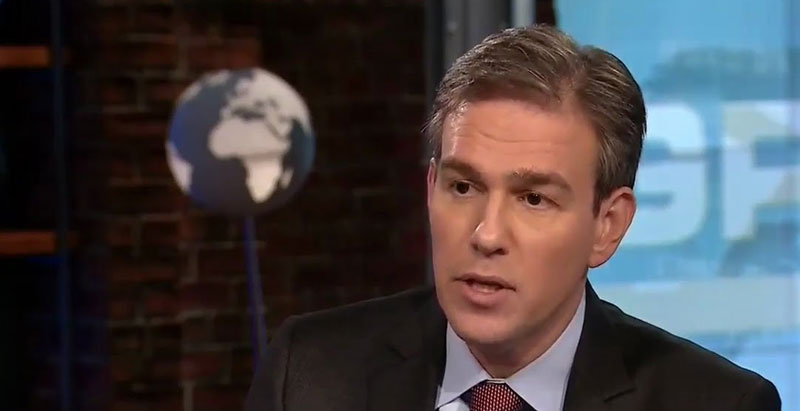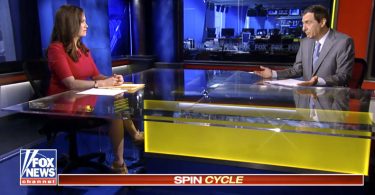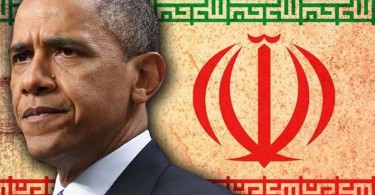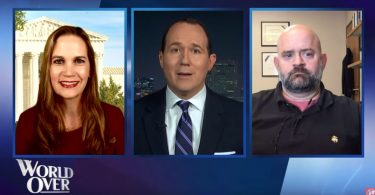I interviewed Pulitzer Prize-winning author Bret Stephens. His recent book is entitled America in Retreat: The New Isolationism & the Coming Global Disorder. Bret is the foreign affairs columnist and the deputy editorial page editor of the Wall Street Journal. This interview was published in Providence: A Journal of Christianity & American Foreign Policy.
Gayle Trotter
You wrote a piece recently entitled, “The GOP Gets What It Deserves.” You pointed out that Donald Trump, in a recent interview with the New York Times, adopted as his slogan, “America First.” In your piece, you talk about the historic significance of that phrase and ask the question “Is Donald Trump acting as Rodney Dangerfield or is he acting as Lenny Bruce, when he’s taking this position in foreign policy.” Could you explain the background, and why you ask that question?
Bret Stephens
The America First Committee was notoriously the anti-war movement on the eve of World War II that vigorously fought the Roosevelt administration efforts to throw the United Kingdom a lifeline in its moment of greatest peril. It got started in September of 1940 while the Battle of Britain was still raging. It disbanded three days after December 7th, 1941, after Pearl Harbor. In the middle, its most prominent spokesman was Charles Lindberg who, obviously an American hero at the time, was also an admirer of Germany. He was not an admirer of the Nazis exactly, but certainly of Germany, and who, in his speeches, warned against Jewish agitation for war.
The movement was isolationist in its impulses. It was inflected by anti-semitism and it was profoundly wrongheaded about America’s role in the world and foreign policy in general. It’s the most discredited foreign policy movement in American history with probably no exceptions. It’s hard to think of anything that comes close to it.
Here, 75 years later, you have Donald Trump who may or may not have ever heard of the America First movement. The term was suggested to him by a New York Times reporter, and he eagerly adopted it. But whether through mischief or inadvertence, he has adopted, not only as a slogan, but really in much the same spirit as the America First Committee understood itself, which was: “To hell with the rest of the world. We’ve got to look after ourselves, and we cannot tie our interests to those of our allies.” Whether Trump knows it or not, and whether his fans know it or not, he is, in many significant respects, the resurrection of that populist impulse in American politics that once led us to the edge of disaster, and from which we ought to have learned our lesson.
You never quite know with Trump whether he knows what he’s talking about or doesn’t. It’s hard to decide whether I’m more discomforted by the idea that he’s simply ignorant of this history or, in fact, knows it and is slyly resurrecting it. It’s both, really, for someone who is seriously vying for the presidency.
GT
Contrast that America First ideology with someone like Ted Cruz who is, for example, one of the fiercest defenders of Israel, I would say on the national stage. You write a lot about Israel.
BS
Yes, and he’s terrific on Israel. He’s absolutely terrific. One of the great pleasures of Cruz is not only is he terrific in terms of you know he’s going to do the right thing but he also really understands the right thing. Part of my misgivings about Cruz is that this guy is so bright, that when he acts in certain ways it strikes me as not having the defense of mere ignorance. Everything with Cruz strikes me as a calculation and at the end of the day, when we look for presidents, we’re not simply looking for intellect and we’re not even looking only for ideology that suits our views, we’re looking for character. You know George W. Bush, say what you will about him, had the character during the height of the Iraq War to go for the surge in the face of massive opposition. That sets leaders apart from lawyers.
I think one of the reasons why Cruz fared poorly, or not as well as he thought he would, in what amounted to his one-on-one with Trump, is that Trump strikes a lot of Americans, for all of his flaws, as a leader; and Cruz strikes most Americans as a lawyer.
GT
What’s wrong with lawyers?
BS
It depends on whether you’ve been screwed by one or not. And whether you feel…
GT
You want one on your side.
BS
Yes, you want a great lawyer on your side, but Cruz is this uber-lawyer.
GT
Yes, solicitor general, Supreme Court clerk.
BS
And all that is to his credit. I have nothing against lawyers, per se, but I do understand why in the sense of broad strokes when people sort of have a gut reaction to people, I understand people say, “Okay, Trump is a leader.” Now, the reality of Trump is, in many respects, a lousy businessman who was handed a marvelous fortune that he could have simply invested in the S&P500 and ended up with the same amount of money today. He has a terrible business reputation. Ideologically, he’s all over the map. His ideas, when he has them, are ill thought out and usually dangerous. But he has that quality of command and charisma. Cruz may be right on most of the issues and he may be super smart, but he just comes across as a guy who will say anything to get elected.
GT
You made the point in one of your columns that we have all these things that are put out there specifically related to Mexicans, and you make the point that the stats show that many Mexicans are returning, more in the last few years.
BS
Right. As a matter of fact, Mexican immigration is declining, but you would never know this if you spent the last few years doing nothing but listening to Sean Hannity and thinking [about] that stupid operation on the border or whatever it was called. That gunrunning…
GT
Fast and Furious.
BS
…I mean it’s stupid, idiotic, and wrongheaded, but not the greatest challenge. By the way, if you’re worried about Muslims sneaking across the border to attack us, worry about the Canadian border, because there are large and often radicalized Muslim/Islamist populations in Toronto, in Montreal, in Vancouver. The one time we had a serious terrorist threat coming across the border, it was in the State of Washington, which as far as I know does not border on Mexico.
GT
You’ve written too about how some of the strains in the west are leading to this. You look at Jihadi John and the Tsarnaev Brothers, the San Bernardino killer, Syed Farook, that it’s not just this radicalization from people like Awlaki, but…
BS
All these people are the children of Noam Chomskey as much as the children of Mohammed. It’s that blending of the far left coming out of the West and, of course, their own religious traditions that create this toxic ideology.
You want to understand what an isolationist or “non-interventionist foreign policy” does? Look at what happened to us, again, in the interim war years. You want to understand what hostility to immigration is? Ask yourself why is it that the overwhelming majority of our Nobel Prize winners are either immigrants or descendants from immigrants. Are we sorry that Albert Einstein came here along with the cream of European intelligentsia? People like Edward Teller and Enrico Fermi gave us the atom bomb so we could drop it against our enemies?
GT
And many of them are at the University of Chicago, I might add.
BS
Many of whom at the University of Chicago, by that beautiful Henry Moore stature.
GT
Yes.
BS
Under the bleachers of Stagg Field. Those are assets for the United States. White working America is also working at places like Intel, and Intel was founded by a Jewish-Hungarian immigrant. They’re benefiting from Google, one of whose cofounders is an immigrant from Russia. What are we talking about here? I’m not making an argument based on classes, and I think the whole concept of that is inherently wrongheaded, not to mention insulting
GT
I agree.
BS
I just can’t stand this idea that, you have to understand how the little people see it. That’s the way Democrats talk. That’s the way Liberals talk. Most people want to come to this country to rise, and the Republican Party ought to be the party that says, “We will help you rise, whoever you are. You will rise so that your children may have better lives than the ones you have and that, by the way, 10 years from now, you’re going to be better off than you are today.” That’s what the party should be about, number one. Number two, and three, and then number four and five, we can be about other things as well and we can have other kinds of debates. But until the party becomes an opportunity party and an optimism party, we’re going to be handing one election after another to people like Hillary Clinton.
By the way, that column ended by saying: The most vomitus thought imaginable is that we’re handing this woman, this corrupt, compromised, dreadful person, this carpet bagger and this grifter, the presidency of the United States. We’re handing it to her when she should be an easily defeatable candidate. It’s crazy.
GT
Contrast that America First ideology of Trump with someone like Ted Cruz who is, for example, one of the fiercest defenders of Israel, I would say on the national stage. You write a lot about Israel.
BS
Yes, and he’s terrific on Israel. He’s absolutely terrific. One of the great pleasures of Cruz is not only is he terrific in terms of you know he’s going to do the right thing but he also really understands the right thing.
GT
That’s in contrast to President Obama, about whom you make the point that he has squandered a lot of relationships with allies, particularly with Israel, and you make that point that we are seeing an alliance between some of the Sunni nations and Israel. Israel is diversifying its partnerships with other countries. It doesn’t seem like you’re saying that’s bad for Israel. You’re saying that’s a good thing because Israel needs to do this. But it seems like you’re saying it’s a bad thing for America to be allowing this. Holding back from criticizing Obama’s terrible foreign policy, why do you think it’s critical for the United States going forward? Why is that relationship with Israel so important?
BS
Israel should have as many friends as it can get. It’s unfortunate that it’s discovering friends in the Arab world through their mutual disgust with the Obama Administration. You know the great joke is Obama really did bring Middle Eastern peace. Everyone, Arabs, as well as Jews, are united in despising him.
The United States should support Israel, because it’s an outpost of freedom and western civilization and liberal values in a corner of the world where we are going to be engaged, whether we like it or not, for a long time. We know that Israel, no matter what, is always going to be an ally. Can’t say that about many other countries. Never mind the historic debt, the profound personal ties, everything else.
We also should support Israel because we’ve found over the years that when we come to the support of embattled little outposts of freedom, whether it’s South Korea or West Berlin, over the long time, that support redounds to our credit. Half of America has a Samsung phone in his or her pocket. That’s all because we defended Korea from communist aggression 65 years ago. We made sure that Stalin couldn’t force West Berlin into submission in 1948. We defended a militarily unattainable position in that city for 40 years and low-and-behold, when the wall came down, it came down in Berlin, because East Berlin could look over and say, “Why is it so much better just across that wall?” Why are they so much richer, happier, freer, more prosperous?” West Berlin became a giant billboard for capitalism and freedom smack in the heart of the communist world. So it was not an accident that when the wall fell, it fell there.
The point is that these investments in our values turn out over time to be investments in our interests. I would say the same thing for Israel. That’s not to say that you can’t exclude the pure interest calculation in foreign policy, but you shouldn’t forget the values calculation as well. In the case of the Arab world, we should have a president who understands that it’s better to have the Egyptians, the Saudis, the UAE, as allies, even if they are free riders, than as adversaries creating their own foreign policy. The one advantage we have in the Middle East is that typically, in the past, when Saudi Arabia was thinking of sending troops into a neighboring country, they would consult us first. But they’ve sent troops into two neighboring countries in the last five years, Bahrain and Yemen, basically while telling us to buzz off now. In Yemen, maybe it doesn’t matter. Bahrain, we’ve got a huge base there. The 5th Fleet is based in Bahrain, so we do have interests and above all, we have an interest in a world in which we are the buffer between the free world or at least the semi-free world against the enemies of freedom and that’s Iran, that’s China, that’s Russia, principally today, and ISIS, of course.
If we’re not that buffer, then you have a world in which everyone is in play and countries freelance their foreign policy, often in ways that don’t suit us, and might be dangerous, and create a kind of disordered world from which we might find ourselves in trouble. We’ve seen this movie before; it was called the interwar years. It was the twenties and the thirties, and it ended in the greatest disaster for the United States.
This is why early in my book somewhere I quote that conversation that Churchill had with Franklin Roosevelt when Roosevelt asks Churchill, “What should we call this war?” And Churchill says, “We should call it the Unnecessary War. There never was a war more easy to stop than that which has just wrecked what was left of the world from the previous struggle.” That’s a great observation. I think one of the great mistakes we make…historically is when we talk about World War II is somehow the greatest generation. This was the generation that actually blundered into war and had to pay a terrible price in order to prevent totalitarian disaster.
The lesson of the greatest generation is “Don’t repeat the mistakes of the America First Committee,” and here we are.
GT
Excellent. Thank you.
First published in Providence: A Journal of Christianity & American Foreign Policy in May 2016








